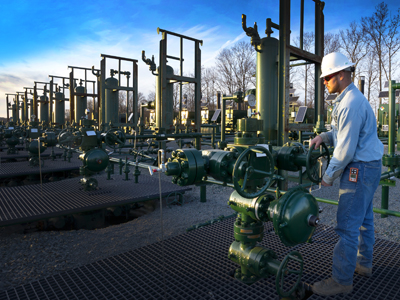Cabot Oil & Gas Co., which claimed 15 of the 20
most-productive Marcellus Shale natural-gas wells during the first half of this
year, reported more eye-popping numbers Monday for its Susquehanna County
operations.
The Houston energy producer said that 10 wells drilled from
a single well pad in Auburn Township produced as much gas in 30 days as the
entire city of Philadelphia uses in an average month.
In technical terms, the wells had a combined average 30-day
production rate of 168 million cubic feet per day, or five billion cubic feet
for the month.
"This 10-well pad represents the new standard for
operational efficiencies and technological advancement in our Marcellus
operations," Dan O. Dinges, Cabot's chief executive officer, said in a
statement.
Though all natural-gas wells go into production decline from
the day they start, the wells are expected to produce for decades. And
Marcellus Shale producers are bringing new wells on line faster than the
existing wells deplete.
The U.S. Energy Information Administration on Monday
reported that Marcellus production in Pennsylvania and West Virginia is
expected to exceed 13 billion cubic feet per day in December, about 18 percent
of total U.S. gas production. Marcellus production was two billion cubic feet per
day in 2010.
"The rise of Marcellus production in both absolute
terms and as a share of total U.S. production is a key development in a rapidly
evolving U.S. natural-gas market," the federal agency said.
Cabot is not the biggest Marcellus producer. But its 200,000
acres are concentrated in Susquehanna County, where the mile-deep shale is 300
feet thick and particularly prolific.
As with many Marcellus producers, Cabot reported continued
improvements in drilling efficiency. It anticipates that drilling costs will
decrease from $6.4 million to $5.8 million per well next year.
Though drilling activity in the Marcellus has subsided in
the last two years because of the low price of natural gas, Cabot plans to
increase its drill rigs from six to seven next year. Each rig is expected to
drill 20 wells a year, said George Stark, a Cabot spokesman.
Following the release of the report, several investment
houses, including Deutsche Bank, raised their outlook for Cabot. Cabot's stock
closed up $1.62 or 4.6 percent, at $36.82.
The industry and the Obama administration have hailed rising
production of domestically produced natural gas as a positive development. But
the dramatic growth, which depends on horizontal drilling and hydraulic
fracturing techniques, has raised fears about environmental and health
consequences for the nation's continued reliance on fossil fuels.
Several environmental groups plan a protest at 12:30 p.m.
Tuesday at Sunoco Logistics Partners L.P.'s headquarters on Market Street. The
activists are opposed to the company's plan to bring propane and ethane by
pipeline from Western Pennsylvania to Marcus Hook, where the fuels will be
loaded onto ships for export.
"We're told this natural gas is great for energy
independence, but here we are exporting it," said Joseph Minott, the
executive director of the Clean Air Council, one of the groups involved in the
protest.
Source: Philly.com

No comments:
Post a Comment